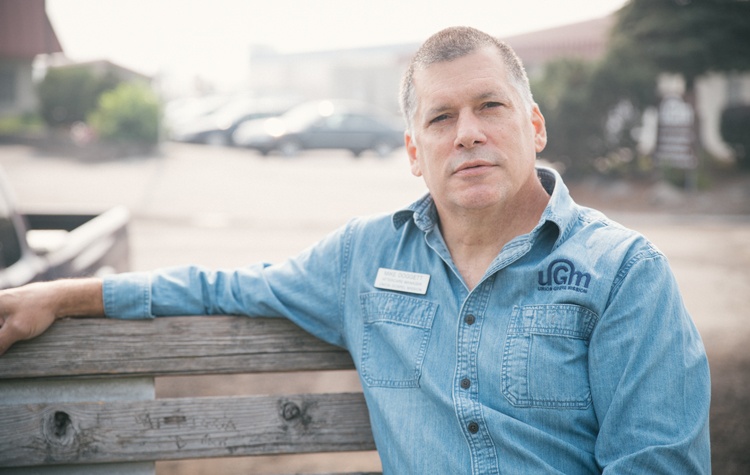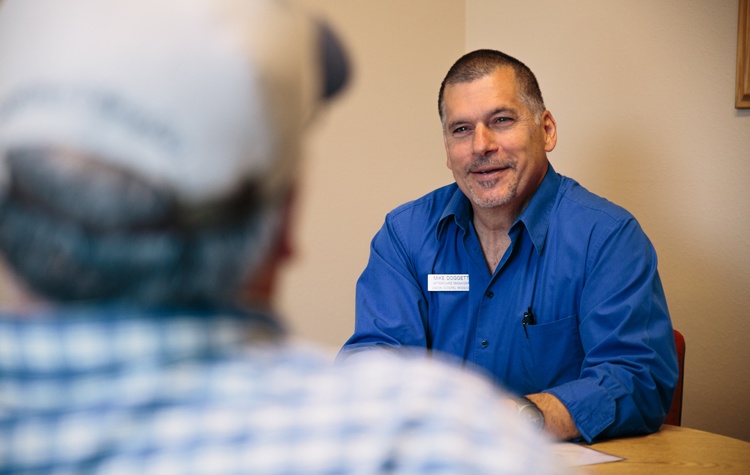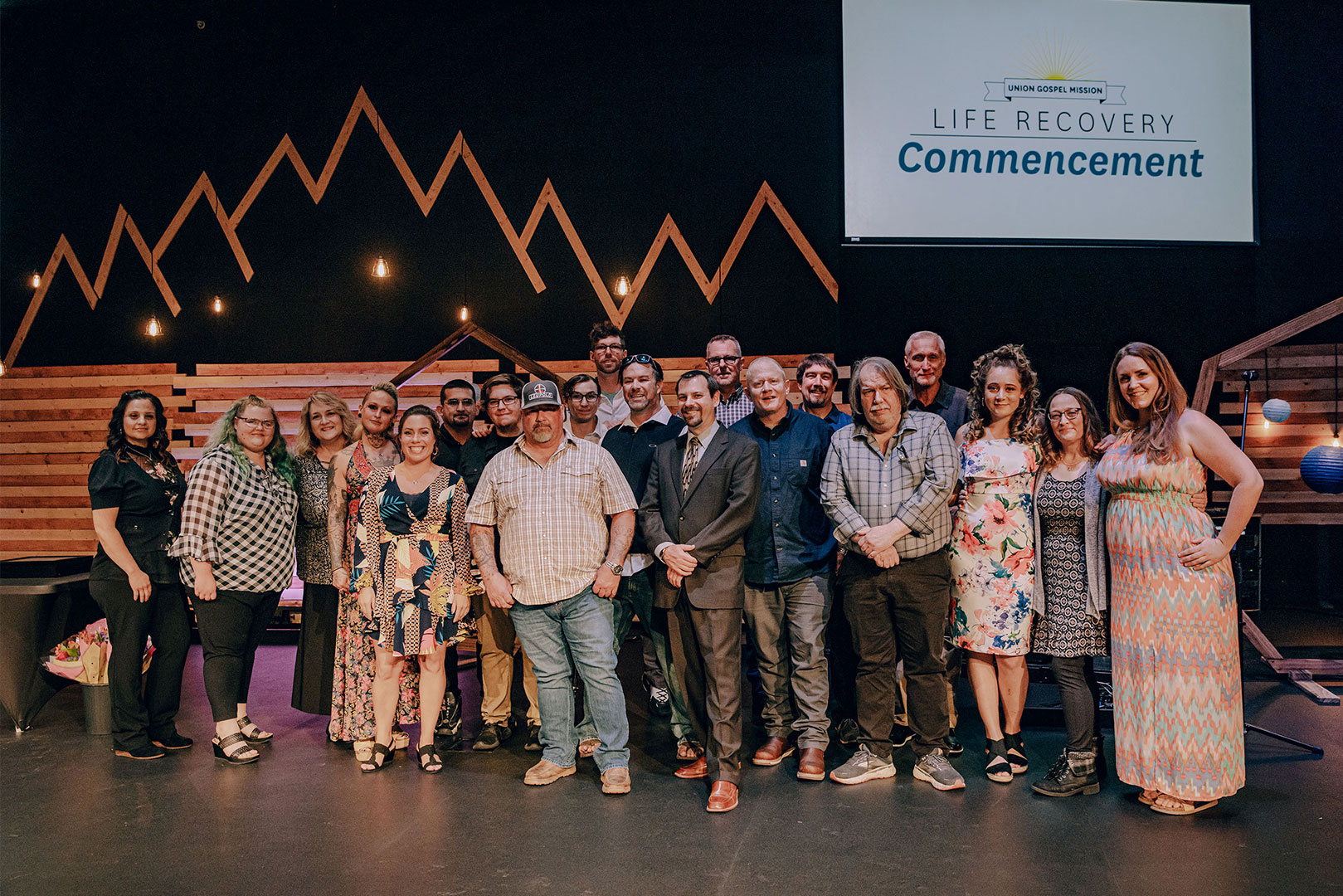2 min read
Gospel-Centered from the Start
“Let us hold unswervingly to the hope we profess, for He Who promised is faithful…Jesus Christ is the same yesterday, today, and forever.” (Hebrews...
UGM Aftercare Manager Mike Doggett walks with residents as they transition out of our programs and back into society. He knows that if they can maintain their sobriety for 5 years, their chances of continuing in lifelong recovery are close to 85 percent. Sometimes, however, he has the discouraging job of facing repeated incidents of relapse.
"I keep fighting voices in my head that say I'm not enough" -Lauren Daigle.
By Mike Doggett, UGM Aftercare Manager
The caller on the other end of the line was a former resident who had fallen deep into her meth addiction, her world was falling apart. I tried to support and encourage her as best I could, offering advice and options for her to consider as her next steps. She seemed sincere claiming she had reached her proverbial bottom and was serious about her recovery this time. As much as I wanted this to be true, her call was one of many I had received that week and my compassion level was low. The song “Even If” by Mercy Me describes how I was feeling as I hung up the phone with her:
They say sometimes you win some
Sometimes you lose some
And right now, right now I’m losing bad
I’ve stood on this stage, night after night
Reminding the broken it’ll be alright
But right now, oh right now I just can’t
Lyrics from a new Lauren Daigle song, “I keep fighting voices in my head that say I’m not enough,” have resonated with me over these past couple of weeks as I wrestle with the questions, "Who am I?" and "What is enough?"

Several times per week I introduce myself in meetings as “Mike, a recovering alcoholic” or "Mike, a child of God” and go on to share an experience I hope will positively impact those hearing me. I provide instruction on working the 12-steps; directions on how to find a mentor or sponsor; recommendations of activities for lifelong recovery; and encouragement for those who may have tripped on their recovery. My days and nights are often spent coaching those who have relapsed and are back doing those things they swore they would never do.
I go to church, tithe regularly, read the Bible, pray and rarely listen to any music other than what is on a Christian radio station. I work for the Union Gospel Mission where prayer is encouraged as a daily work activity. The cover of my life book might be entitled “Arrived," but when you start reading the pages of my book and get to know the real me, you realize that I, like so many of those I work with, still struggle with those voices in my head and still have a long way to go.
I am an alcoholic in recovery who, by the Grace of God, has been pulled back from the brink, and as much as I would like to say I have arrived, I know that this will be a lifelong journey and it is by no means a linear path. I have days where I am on the mountain top and feel the absolute presence of God. I have other days where Satan seems to be winning the battle. Lately, those days have become more frequent as the incidence of relapse has increased and I am left with that question, “Who am I and am I doing enough?”

I spend hours consulting with individuals about their recovery, pouring my heart out to them, sharing my experience, hope and strength only to get a phone call on a Saturday night from an addict who thought the next drink or next hit would be different. I do my best to keep my head up and move forward with a positive attitude but this is just one of many calls I will get this week. The next line in that Lauren Daigle song invades my thoughts, “Every single lie that tells me I will never measure up,” and I give the evil one another foothold and start questioning if God truly opened the door to this job for me. Doubt seeps into my thoughts and I personalize and internalize these relapses of others as my failures. I didn’t do enough or “I’m not enough."
In her book, The Last Addiction, Sharon Hersh describes the last addiction as “the idea that I can save myself, with myself. We know—I mean deep down we know—that it is futile to try to save ourselves with the very selves that got us into trouble in the first place.” In 1998, I had to accept the fact that I needed help, that I was powerless over my addiction and that I had lost control. It wasn’t, however, my first attempt at getting clean and sober.
In 1994, after being told I had a drinking problem, I set out to prove this person wrong by fixing myself, with myself. I quit drinking and white knuckled it for four years, never admitting I had a problem. In 1998, I received, as Sharon Hersh describes it, “the gift of getting caught” after a week-long relapse that ultimately resulted in a stint in rehab and a change in a 19-year place of employment.
Rehab, 12-Step meetings, change of vocation, and some ongoing therapy truly had an impact on my sobriety, but the most profound change came when I met and accepted Jesus into my life in 1998. Jesus was that “power greater than I that could restore me to sanity” (modified step 2 of AA). In my attempt to fix myself with myself in 1994, I swept out the idols of alcohol and drugs but failed to put anything good in place of them. Jesus talks about this condition in Matthew 12:43-45 where he reminds us of the dangers of cleaning up our life without filling it with God.
The chorus of that Lauren Daigle song ("You Say") is what I have to lean on when Satan is trying his best to move back into that house that I cleaned out.
You say I am loved when I can’t feel a thing
You say I am strong when I think I am weak
And you say I am held when I am falling short
And when I don’t belong, Oh you say that I am Yours
And I believe—
Sonny Westbrook recently reminded me of another important factor in this relapse equation: Not only can I not fix myself with myself, but I cannot fix anyone else either. My job description does not include the words, “heal the addict." That is God’s job. My job is to give people a map, then step back and allow God to do his work. God does not work on my timeline. I need to believe that his desire is that no one perish (2 Peter 3:9), that those who are relapsing will do as I did and one day accept the healing power of Christ in their lives.
As I discovered in my life, a relapse can be the catalyst that propels a person into lifelong recovery and more importantly into a lifesaving relationship with the One who makes all things new.
So who am I?
I am a Recovering Alcoholic who chose not to pick up that next drink.
I am one drink away from death, one prayer away from eternal life with my Savior.
I am a sinner whose sins have been covered by Jesus on the Cross.
I am a Child of God.
I recently heard a mentor speak of her experience with a person who has continued to relapse time and time again. She said, “I know she has accepted Jesus into her life; yet, she has not let go of this addiction, and there is a high likelihood that her freedom from addiction may only come when she goes home to meet her Savior Jesus."
As I reflect on these last couple weeks, I am reminded of Ephesians 6:12: We are not fighting against flesh and blood. Addiction, like Satan, is cunning, baffling and powerful. Its aim is to kill, steal and destroy. I am a Child of God, but I am not God. When I am feeling like I am not doing enough, I need to remember that there is One who can. 2 Peter 3:9 states that “His desire is that no one perish." It does not say that no one will perish. Our omnipotent, all-powerful God accepted the fact that, though he has set a place for all at His Table, not all will accept the love and healing he offers. Who am I to think that I can outperform God?
We, the LIFE Recovery Program, plant the seeds in the lives of those we work with and through Aftercare continue to water and provide support, but it is God who will ultimately determine the when, where and how of those who will receive his saving grace.

Today my compassion tank was replenished when I spent almost three hours with Ann and Carolyn, graduates from Anna Ogden Hall. We spoke openly about our recovery, each sharing our experience, strength and hope as we set about the task of phoning others who had gone through the UGM LIFE Recovery Program. As I listened to these women reaching out to the person at the other end of the line, I got a glimpse of what our program has done for them and knew without a doubt that God is still in the business of doing miracles. And though we (UGM) have our share of relapses, we also have many others like Ann and Carolyn who are a testament to the work that our counseling teams do in sharing the love and hope of Jesus Christ.
Finally, a last verse in the Lauren Daigle song:
Taking all I have and now I’m laying it at Your feet
You have every failure God, You have every victory
Oh, I believe, Yes I believe
What you say of me
I believe.
It isn't easy work, but it is meaningful. We invite you to join us. Sign up for a volunteer orientation.

2 min read
“Let us hold unswervingly to the hope we profess, for He Who promised is faithful…Jesus Christ is the same yesterday, today, and forever.” (Hebrews...

9 min read
To celebrate 75 years of serving the Inland Northwest, we are spending the year remembering our history and the faithfulness that built us and...

2 min read
In 2026, Union Gospel Mission Inland Northwest is approaching our 75th Anniversary! This is a milestone that invites gratitude and reflection, and...

You may notice we’ve changed the name of the annual event we used to call "graduation," and here’s why: The former name gave the impression that...

Editor's note: This is the third post in a special Advent devotional series, focusing on Isaiah 61:1-3. You may also want to read the introduction, "...

For individuals dealing with overwhelming personal issues such as addiction, domestic violence, or a criminal record, UGM LIFE Recovery can be the...